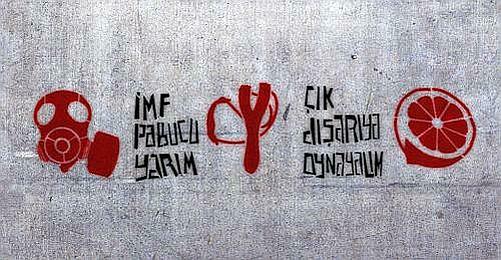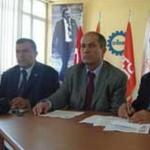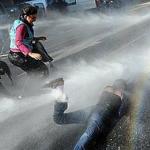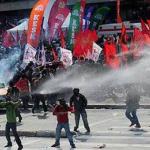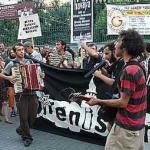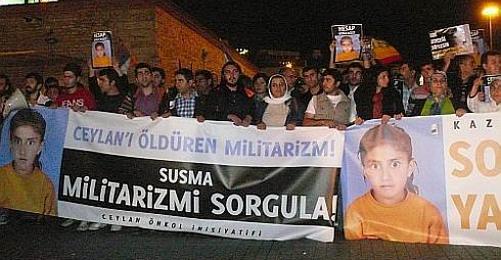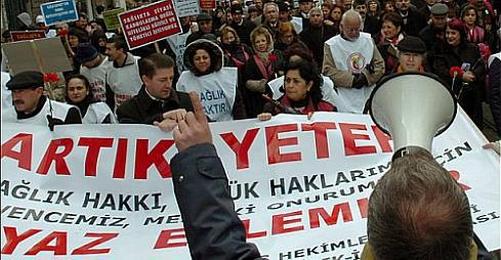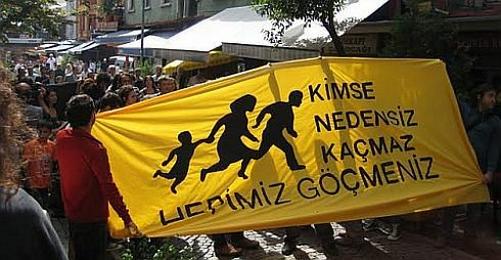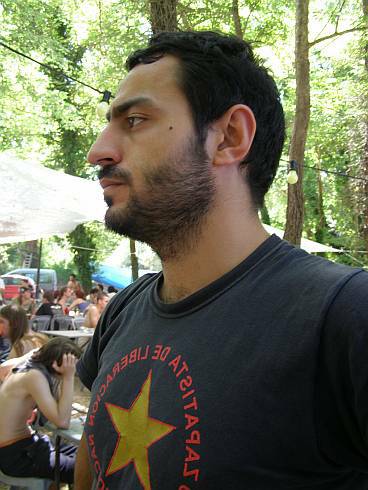
So why do we have to oppose to IMF and WB?
One of the groups representing this opinion is Direnistanbul ('Resistanbul'). We got hold of the group's member Fırat Genç between two protests actions and interviewed him.
"What is the IMF? What is the World Bank?"
"IMF and World Bank are institutions that have not emerged just recently. They have existed for more than 60 years, but we became more familiar with these institutions after the 1980s because the number of countries using loans increased. While this number rose, the amount of the debts has steadily risen too. Countries that did not significantly develop over the last 30 years are now stuck in a debt spiral".
In Genç's opinion people living in Turkey know this story best since Turkey is a "regular guest" among the countries using credit, thus people reading newspapers or watching television are aware of IMF and World Bank.
"IMF and World Bank do not take action for a beneficial outcome"
"One of them is actually a brokerage institute, the other one is a bank doing business on a global scale. Their basic business is to bring together countries that need credit and countries with sufficient cash reserves that are able to create credits. Canada for instance has got enough money to invest into these banks whereas Bangladesh on the other hand is looking for credit to sustain the enormous deficits in their annual budget. IMF and World Bank combine this unity. But the real problem is that with all their good intentions they are not taking actions for a beneficial outcome."
Genç explains the cost of the debt as follows:
"Interest is charged anyway. Of course the interest accumulates and is added to the debt, this way a never-ending credit spiral sets off. We know this situation very well because Turkey is one of the most constant countries with debts".
"Programs realized on behalf of the state"
Yet according to Genç, the programs offered to the countries applying for credit are even more important.
"I am saying 'offering' though we are actually talking about obligations. Privatization going on for years and years, limitations of the public budget, cuts of agriculture subsidies etc. All these measures are a result of the 'recommended' structural adjustment programs. These programs are executed by the government of course. So there is no devil from outside imposing things that we do not want".
Genç suggests to think about AKP [ruling Justice and Development Party] saying that they will find other sources for the credits needed. Just like their predecessors they say that they will carry on with the proposed regulations for the structural adjustment programs.
Genç points out that nothing has changed: "Most people think that if these institutions are not involved into our business anymore, our life will be nice and rosy".
The Direnistanbul member names examples for the structural adjustment programs:
* Today's education system is in such a disasterous condition, on one hand it is announced that teacher positions will be opened, on the other hand thousands of fresh graduates wait for their appointments. This is a result of cutting the public budget according to the adjustment program.
* It is because of the adjustment programs that we have a housing problem in this city which is getting worse day by day.
* It is the World Bank's responsibility that genetically modified products or 'terminator seeds' became part of our life since monoculture agriculture became an obligation and the WB liberates credits for this kind of agriculture.
* Furthermore the World Bank is responsible for the miserable conditions of southeast Asia communities that lost their living space because huge dams were built.
* In recent years micro-credits invented by the World Bank mushroomed as if they were the solution to poverty. Did the World Bank not condemn women to their homes even more when they allow credits for women working at home under precarious conditions?
"IMF and World Bank are in Istanbul, Istanbul is on the streets"
Genç, who coordinates protest actions from 1-8 October in Istanbul, adds:
"For more than 2 months we have worked on a common organization. In the evening of 28 September we had a good start with a protest action in Tünel [centrally located popular district of Istanbul]. From now on we will be on the streets every single day for the whole week".
Genç repeats the call from Direnistanbul once more:
"We raise our voices against the national and global capital of IMF and World Bank, against the government that reminds us day by day that fascism has never stopped, against the police who try to take the streets away from us. This is what a festival of resistance means to us. (EZÖ/VK)





